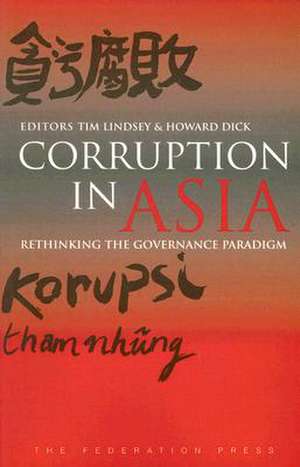Corruption in Asia: Rethinking the Governance Paradigm
Editat de Tim Lindsey, Howard Dicken Limba Engleză Paperback – 28 feb 2002
Preț: 205.91 lei
Preț vechi: 272.97 lei
-25% Nou
Puncte Express: 309
Preț estimativ în valută:
39.41€ • 41.09$ • 32.75£
39.41€ • 41.09$ • 32.75£
Carte indisponibilă temporar
Doresc să fiu notificat când acest titlu va fi disponibil:
Se trimite...
Preluare comenzi: 021 569.72.76
Specificații
ISBN-13: 9781862874213
ISBN-10: 1862874212
Pagini: 223
Dimensiuni: 157 x 239 x 13 mm
Greutate: 0.38 kg
Editura: Federation Press
ISBN-10: 1862874212
Pagini: 223
Dimensiuni: 157 x 239 x 13 mm
Greutate: 0.38 kg
Editura: Federation Press
Cuprins
Contents Introduction History Always Repeats? Corruption, Culture and 'Asian Values' Tim Lindsey PART I - Frameworks Governance, Post-Washington Consensus and the New Anti-Politics Kanishka Jayasuriya Anti-corruption and Asian Legal Professions Veronica Taylor Functions and Dysfunctions of Corruption and its Reporting in Central and Eastern Europe Leslie Holmes PART II - Indonesia Corruption and Good Governance: The New Frontier of Social Engineering Howard Dick Reflections on Corruption in Indonesia Gary Goodpaster Administrative Reforms in Indonesia? Paul H Brietzke Legends of the Fall: An Institutional Analysis of Indonesian Law Enforcement Agencies Combating Corruption Ibrahim Assegaf PART III - Vietnam Corruption and the Outsider: Multinational Enterprises in Vietnam Elizabeth Maitland The Political-Legal Culture of Anti-Corruption Reforms in Vietnam John Gillespie The Vietnamese Courts and Corruption Pip Nicholson List of Legislation/ Index
